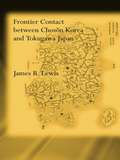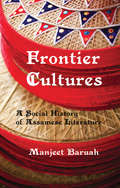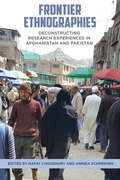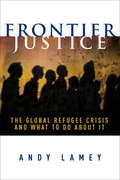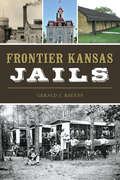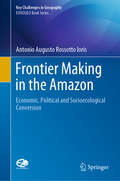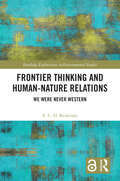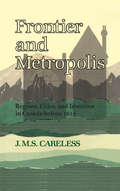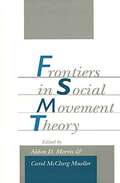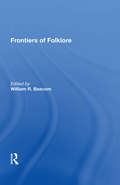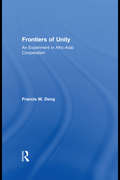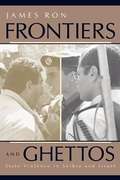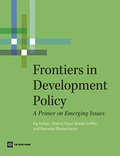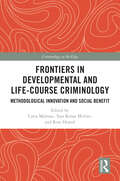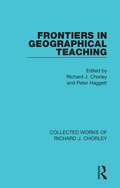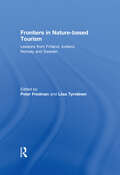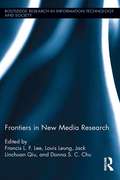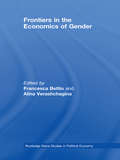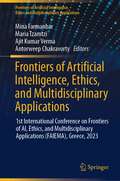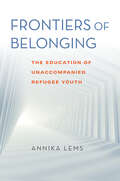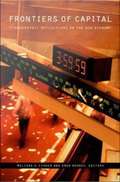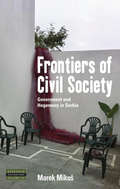- Table View
- List View
Frontier Contact Between Choson Korea and Tokugawa Japan
by James B. LewisEast Asia from 1400 to 1850 was a vibrant web of connections, and the southern coast of the Korean peninsula participated in a maritime world that stretched to Southeast Asia and beyond. Within this world were Japanese pirates, traders, and fishermen. They brought things to the Korean peninsula and they took things away. The economic and demographic structures of Kyongsang Province had deep and wide connections with these Japanese traders. Social and political clashes revolving around the Japan House in Pusan reveal Korean mentalities towards the Japanese connection. This study seeks to define 'Korea' by examining its frontier with Japan. The guiding problems are the relations between structures and agents and the self-definitions reached by pre-modern Koreans in their interaction with the Japanese. Case studies range from demography to taxation to trade to politics to prostitution. The study draws on a wide base of primary sources for Korea and Japan and introduces the problems that animate modern scholarship in both countries. It offers a model approach for Korea's northern frontier with China and shows that the peninsula was and is a complex brocade of differing regions. The book will be of interest to anyone concerned with pre-1900 East Asia, Korea in particular, and especially Korea's relations with the outside world. Anyone interested in early-modern Japan and its external relations will also find it essential reading.
Frontier Cultures: A Social History of Assamese Literature
by Manjeet BaruahThe study of Assamese literature has so far been in terms of the history of the Assamese language. This book is a history of the narratives written in Assamese language and its relation to the process of region formation. The literature dealt with ranges from pre-colonial chronicles, ballads and drama to modern genres of fiction and critical writing in Assamese language. Taking the Brahmaputra valley and Assamese literature as case studies, the author attempts to link literature, its nature and use, to processes of region formation, arguing that such a study needs to take the context of historical geography into consideration. The book views region formation in north-east India as a dialectical process, that is, the dialectic between the shared and the distinct in inter-group and community relations. It borrows an anthropological approach to study written narratives and cultures so as to locate such narratives in specific processes of region formation.
Frontier Encounters
by Franck Billé Grégory Delaplace & Caroline HumphreyChina and Russia are rising economic and political powers that share thousands of miles of border. Yet, despite their proximity, their practical, local interactions with each other — and with their third neighbour Mongolia — are rarely discussed. The three countries share a boundary, but their traditions, languages and worldviews are remarkably different. <p><p> Frontier Encounters presents a wide range of views on how the borders between these unique countries are enacted, produced, and crossed. It sheds light on global uncertainties: China’s search for energy resources and the employment of its huge population, Russia’s fear of Chinese migration, and the precarious economic independence of Mongolia as its neighbours negotiate to extract its plentiful resources. <p> Bringing together anthropologists, sociologists and economists, this timely collection of essays offers new perspectives on an area that is currently of enormous economic, strategic and geo-political relevance.
Frontier Ethnographies: Deconstructing Research Experiences in Afghanistan and Pakistan
by Annika Schmeding Nafay ChoudhuryEthnography destabilizes the notion of the frontier as merely a geographic space and conveys its limitations—that lead researchers to reflect on their methodological approaches. Frontier Ethnographies explores the ethnographic edges of contemporary anthropological inquiry in Afghanistan and Pakistan by assembling voices of emerging scholars who have conducted field research within the region in the past two decades. Through examining moments of insecurity, vulnerability, doubt, fear, failure, and daydreaming, researchers reflect on their own experiences of field research and how—faced with frontiers—they have been forced to reimagine or reconstruct their understanding of the social world.
Frontier Justice
by Andy LameyFrontier Justice is a gripping, eye-opening exploration of the world-wide refugee crisis. Combining reporting, history and political philosophy, Andy Lamey sets out to explain the story behind the radical increase in the global number of asylum-seekers, and the effects of North America and Europe's increasing unwillingness to admit them.He follows the extraordinary efforts of a set of Yale law students who sued the U.S. government on behalf of a group of refugees imprisoned at Guantánamo Bay; he recounts one refugee family's harrowing journey from Saddam Hussein's Iraq to contemporary Australia via the world's most dangerous ocean crossing; and he explores the fascinating case of Ahmed Ressam, the so-called Millennium bomber who filed a refugee claim in Canada before attempting to blow up the Los Angeles airport. Lamey casts new light on a host of broader subjects, from the reasons why terrorists who pose as refugees have an overwhelming failure rate to the hidden benefits of multiculturalism. Throughout Lamey's account, he focuses on the rights of people in search of asylum, and how those rights are routinely violated. But Frontier Justice does not merely point out problems. This book offers a bold case for an original solution to the international asylum crisis, one which draws upon Canada's unique approach to asylum-seekers. At the centre of the book is a new blueprint for how the rights of refugees might be enforced, and a vision of human rights that is ultimately optimistic and deeply affirmative. In exploring one of the most pressing questions of our age, Lamey provides an absorbing and unsettling look at a world in which, as he notes, there are many rights for citizens, few for human beings.From the Hardcover edition.
Frontier Kansas Jails (Landmarks)
by Gerald J. BayensGunslingers, gamblers and outlaws vastly outnumbered sheriffs and marshals in the cattle towns of the Kansas frontier. Famous lawmen, such as Charlie Bassett, Wild Bill Hickok and Tom Smith, kept the peace by sheer force of personality and the integrity of the local lockup. The story of the state’s settlement can be tracked in the fascinating development of these bastions of prairie justice. Makeshift jails of earlier times were replaced by limestone, brick and concrete structures with iron cells and elaborate locking systems. From the squirrel cage of Wichita to the iron jail of Lawrence City, tour these early Kansas prisons with author Gerald Bayens.
Frontier Making in the Amazon: Economic, Political and Socioecological Conversion (Key Challenges in Geography)
by Antonio Augusto IorisThis book discusses the outcomes of more than ten years of research in the southern tracts of the Amazon region, and addresses the expansion of the agricultural frontier, consolidation of the agribusiness-based economy, and expansion of regional infrastructure (roads, dams, urban centres, etc).It combines extensive empirical evidence with the international literature on frontier-making and regional Amazonian development, and adopts a critical politico-geographical perspective that will benefit scholars in various other disciplines.This book is intended to push the current theoretical and methodological boundaries regarding the controversies and impacts of agribusiness in the region. A new international scientific network, led by the author, is investigating the broader context of the themes analysed here.
Frontier Nursing in Appalachia: History, Organization and the Changing Culture of Care
by Edie WestThis book provides a historical analysis of the Frontier Nursing Services in the Eastern Appalachians of the United States, as well as a review of the oral history tradition of former frontier and non-frontier nurses. The data was gathered from 2003 to 2007, and the historical part covers the years 1900 to 1970. The objective of the study presented here was to conduct interviews with former frontier and non-frontier nurses in order to better understand their family and personal relationships, and the experiences that motivated their career choices. These interviews also give a voice to the working and middle-class women of the FNS. The emerging themes include moral inhabitability in work/education environments, the generational mix, nurse-physician and male-female relationships at the workplace, the role of technology, humanitarian versus financial rewards, and the public image of nurses. In addition, the book examines how the FNS shifted from a community/grass-roots structure to the corporate/business model of healthcare delivery employed today. In closing, it stresses the importance of explorig past nursing in order to better grasp present nursing. It also represents a testament to the professional work and vital contributions of frontier nurses.
Frontier Thinking and Human-Nature Relations: We Were Never Western (Routledge Explorations in Environmental Studies)
by E. C. KeskitaloCombining historical, social and regulative analysis, this book builds a compelling critique of ‘frontier thinking’ as it continues to form our assumptions about social and environmental organisation – in ways that impact not least the present environmental crisis.This book systematically identifies the ways in which images of nature and society are formed by the historically developed frontier-oriented narratives which have underpinned much Anglo-American and Anglocentric thought. The book confronts these conceptions at large, showing that they never held empirically, and contrasts them with the situation in northern Europe, where diverging assumptions are integral to this day. Through this juxtaposition, this book illustrates not only the pervasiveness of structures of understanding in steering policy but also the varying traditions regarding how understandings of the environment can be formed.This study highlights how historical thought patterns, formed for very different reasons than exist today, continue to shape our assumptions about nature, the relation between urban and rural areas and our understanding of ourselves in relation to the environment. This book will be of wide interest to a range of academics and students in the fields of geography, anthropology, environmental studies, sociology, political science and development studies, amongst others.
Frontier and Metropolis: Regions, Cities, and Identities in Canada before 1914
by J.M.S. CarelessThe regional character of Canada and the crucial role of metropolitan development in its history have been recurring themes in the work of J.M.S. Careless. In these essays he returns to those themes, discussing how national and regional identity in Canada show vital links with metropolitan-hinterland relationship across time and space.The first essay presents an overall appraisal of the historic connections between metropolitan centres and frontiers or regions in Canada. These connections might be manifested in economic structures, political fabrics, or social networks, and also in modes of opinion and popular images and traditions. The second part of the book inquires into some major conceptual treatments given to frontier and metropolis in history. The third seeks to evaluate the impact of metropolitanism on distinctive features of identity that are revealed in Canadian historical experience. A fourth essays rounds out the volume by discussing the influence of external metropolanism in Canada.Careless endows his subject with the combined fornce of his own continuing research, his sensitivity to the new historical scholarship, and the lively and penetrating mind that have made him one of Canada's leading historians for more than thirty years.
Frontiers In Social Movement Theory
by Aldon D. Morris Carol McClurg MuellerSocial protest movements such as the civil rights movement and the gay rights movement mobilize and sustain themselves in ways that have long been of interest to social scientists. In this book some of the most distinguished scholars in the area of collective action present new theories about this process, fashioning a rich and conceptually sophisticated social psychology of social movements that goes beyond theories currently in use. The book includes sometimes competing, sometimes complementary paradigms by theorists in resource mobilization, conflict, feminism, and collective action and by social psychologists and comparativists. These authors view the social movement actor from a more sociological perspective than do adherents of rational choice theory, and they analyze ways in which structural and cultural determinants influence the actor and generate or inhibit collective action and social change. The authors state that the collective identities and political consciousness of social movement actors are significantly shaped by their race, ethnicity, class, gender, or religion. Social structure--with its disparities in resources and opportunities--helps determine the nature of grievances, resources, and levels of organization. The book not only distinguishes the mobilization processes of consensus movements from those of conflict movements but also helps to explain the linkages between social movements, the state, and societal changes.
Frontiers Of Folklore/h
by William R BascomFrontiers of Folklore explores some of the avenues of research that are exciting young folklorists today. In the introduction, William Bascom reviews briefly the development of folklore theories and suggests three frontiers of folklore that remain to he explored. Alan Bundes asks the question? "Who are the folk? Pointing out that folklore exists
Frontiers Of Unity: An Experiment in Afro-Arab Cooperation
by Francis DengThis book deals with the conflict between Northern and Southern Sudan over the Abeyi region and other border areas. This area has historically been a model of peaceful coexistence and cooperation but since its independence it has become a point of violent confrontation. Frontiers of Unity provides an essential background to the complexities of the conflict, looking at the factors behind it and calling for the resolution of Africa’s longest running dispute. First written in 1972, after the agreement that ended the war in Sudan, the original text has been supplemented by additions and modifications to update its relevance to the current situation in Southern Sudan. In 1983, the continuing dispute in Abyei led to the resumption of hostilities and the eventual escalation into a full-fledged armed struggle under the leadership of the SPLM/A, which continues today. Without resolving the cause of Abyei and the other border areas of the Nuba and Southern Blue Nile, no sustainable peace between the North and South is possible. This important historical document will be of great relevance to scholars of African-Arab relations, conflict and peace studies and nation building.
Frontiers and Ghettos: State Violence in Serbia and Israel
by James RonThis is an original and controversial comparison of Serbia and Israel, which critically examines state violence visited upon non-Serbians and Palestinians.
Frontiers in Development Policy
by Shahid Yusuf Raj Nallari Breda Griffith Rwitwika BhattacharyaThe global crisis of 2008-09 has brought to the forefront a plethora of economic and political policy issues. There is a re-opening of discussion on basic economic concepts, appropriate framework for analysis, role of private and public sectors in the economy, structural transformation of economies, human development and managing of growing risks and crises. The purpose of this book has been to bring home the inter-linkages in various parts of the economy and the need for practical policy making to reach development goals while being aware of the instabilities, complexities and downside risks inherent in the nature of a an economy operating in a globalized world. Thematically, this book focuses on two core types of policy: policies that promote strong, sustainable and inclusive growth in low income and middle income developing countries and new and emerging policies that necessitates a discussion amongst policy makers and practitioners. Throughout the book, the authors provide insight in to the different types of policy approaches that can be taken to help the economy grow. Ultimately the book looks to foster discussion amongst policy makers on growth and development.
Frontiers in Developmental and Life-Course Criminology: Methodological Innovation and Social Benefit (Criminology at the Edge)
by Catia Malvaso, Tara Renae McGee, and Ross HomelFrontiers in Developmental and Life-Course Criminology advances the field of developmental and life-course criminology (DLC) by highlighting some recent methodological innovations, and exploring the ways in which DLC criminologists are helping to bridge the gap between science and service by their engagement with policymakers and government and non-government agencies. The book is united by three related themes: the use of new data sources including government administrative data systems, the development of intervention and prevention strategies grounded in DLC research, and resilience, prosocial behaviour, and strengths-based approaches. This book opens up new possibilities for the future of DLC research, orienting the DLC field as one that prioritises the achievement of better outcomes for individuals and society.
Frontiers in Geographical Teaching (Collected Works of Richard J. Chorley)
by Richard J. Chorley Peter HaggettOriginally published in 1965 and with a second edition in 1970. Building upon the original two Madingley Hall seminars for teachers of non-university geography in 1965, this book presents an updated research picture of the 1970 transatlantic perspective. Answering the questions "What is happening in geography" and "What impact does this have on school geography", this provided a real link for students who were then making the increasingly difficult transition from school to university geography. Originally receiving a hostile reaction from British journals, the book’s diagnosis and prognosis were a forerunner of developments in methodological changes of the discipline. This work collects a series of essays delineating geographic concepts in terms of the philosophic underpinnings, assessment of the geomorphic system, climatology, and social economic and historical changing trends. Techniques are reviewed including quantitative methods for geomorphology and social geography, fieldwork both in urban areas and land-use surveys, and finally in physical planning. Final analyses examine and contrast the teaching methods and courses in American and British High Schools, Colleges and Universities.
Frontiers in Nature-based Tourism: Lessons from Finland, Iceland, Norway and Sweden
by Peter Fredman Liisa TyrväinenNature has been a key attraction factor for tourism in the Nordic countries for decades. The demand for nature-based tourism has steadily grown and is one of the most rapidly expanding sectors within tourism across Europe and elsewhere. This demand has created opportunities for nature-based tourism to develop as an economic diversification tool within regions rich in natural amenities. But nature-based tourism is not only about tourism businesses and tourists visiting nature. The natural environment as a basis for tourism involves many challenges related to local communities, public access, nature protection and the management of natural resources.This book covers a broad set of topics in contemporary nature-based tourism from Finland, Iceland, Norway and Sweden. Areas discussed are innovation, fishing rights and supply of angling, recreation experience preferences, national park attractions, the cultural clash between established outdoor recreational use and new tourism activities, the Right of Public Access as opportunity and obstacle, preferences of tourism landscapes, controversies around wilderness development, management of hiking trails, eco-tourism certification, and financing of recreational infrastructure.This book was published as a special issue of the Scandinavian Journal of Hospitality and Tourism.
Frontiers in New Media Research (Routledge Research in Information Technology and Society)
by Francis L. F. Lee Louis Leung Donna S. C. Chu Jack L. QiuThis volume puts together the works of a group of distinguished scholars and active researchers in the field of media and communication studies to reflect upon the past, present, and future of new media research. The chapters examine the implications of new media technologies on everyday life, existing social institutions, and the society at large at various levels of analysis. Macro-level analyses of changing techno-social formation – such as discussions of the rise of surveillance society and the "fifth estate" – are combined with studies on concrete and specific new media phenomena, such as the rise of Pro-Am collaboration and "fan labor" online. In the process, prominent concepts in the field of new media studies, such as social capital, displacement, and convergence, are critically examined, while new theoretical perspectives are proposed and explicated. Reflecting the inter-disciplinary nature of the field of new media studies and communication research in general, the chapters interrogate into the problematic through a range of theoretical and methodological approaches. The book should offer students and researchers who are interested in the social impact of new media both critical reviews of the existing literature and inspirations for developing new research questions.
Frontiers in New Media Research: Frontiers In New Media Research (Routledge Research in Information Technology and Society #15)
by Francis L. F. Lee Louis Leung Donna S. C. Chu Jack L. QiuThis volume puts together the works of a group of distinguished scholars and active researchers in the field of media and communication studies to reflect upon the past, present, and future of new media research. The chapters examine the implications of new media technologies on everyday life, existing social institutions, and the society at large at various levels of analysis. Macro-level analyses of changing techno-social formation – such as discussions of the rise of surveillance society and the "fifth estate" – are combined with studies on concrete and specific new media phenomena, such as the rise of Pro-Am collaboration and "fan labor" online. In the process, prominent concepts in the field of new media studies, such as social capital, displacement, and convergence, are critically examined, while new theoretical perspectives are proposed and explicated. Reflecting the inter-disciplinary nature of the field of new media studies and communication research in general, the chapters interrogate into the problematic through a range of theoretical and methodological approaches. The book should offer students and researchers who are interested in the social impact of new media both critical reviews of the existing literature and inspirations for developing new research questions.
Frontiers in the Economics of Gender (Routledge Siena Studies In Political Economy Ser.)
by Francesca Bettio Alina VerashchaginaGender is now recognized as a fundamental organizing principle for economic as well as social life, and related research has grown at an unprecedented pace in the recent decades across branches of economics. The volume takes stock of this research, proposes novel analytical frameworks and outlines further research directions. It grew out of the Sum
Frontiers of Artificial Intelligence, Ethics, and Multidisciplinary Applications: 1st International Conference on Frontiers of AI, Ethics, and Multidisciplinary Applications (FAIEMA), Greece, 2023 (Frontiers of Artificial Intelligence, Ethics and Multidisciplinary Applications)
by Ajit Kumar Verma Antorweep Chakravorty Mina Farmanbar Maria TzamtziThis groundbreaking proceedings volume explores the integration of Artificial Intelligence (AI) across key domains—healthcare, finance, education, robotics, industrial and other engineering applications —unveiling its transformative potential and practical implications. With a multidisciplinary lens, it transcends technical aspects, fostering a comprehensive understanding while bridging theory and practice. Approaching the subject matter with depth, the book combines theoretical foundations with real-world case studies, empowering researchers, professionals, and enthusiasts with the knowledge and tools to effectively harness AI. Encompassing diverse AI topics—machine learning, natural language processing, computer vision, data analytics and supervisory control — the volume showcases state-of-the-art techniques propelling AI advancements. Structured into four parts: Part 1: Artificial Intelligence (AI), explores evolving deep neural networks, reinforcement learning, and explainable AI, providing a deep dive into the technical foundations of AI advancements. Part 2: Robotics and Control Systems, delves into the integration of AI in robotics and automatic control, addressing supervisory control, automated robotic movement coordination, anomaly detection, dynamic programming, and fault tolerance, offering insights into the evolving landscape of intelligent automation. Part 3: AI and Society, examines the societal impact of AI through chapters on ethical considerations, economic growth, environmental engagements, and hazard management, providing a holistic perspective on AI's role in shaping society. Part 4: PhD Symposium, presents the future of AI through cutting-edge research, covering legal and ethical dimensions, privacy considerations, and computationally efficient solutions, offering a glimpse into the next generation of AI advancements. Catering to a diverse audience—from industry leaders to students—the volume consolidates the expertise of renowned professionals, serving as a comprehensive resource for navigating the ever-evolving AI landscape. An essential reference for those staying at the forefront of AI developments.
Frontiers of Belonging: The Education of Unaccompanied Refugee Youth (Worlds in Crisis: Refugees, Asylum, and Forced Migration)
by Annika LemsAs unprecedented numbers of unaccompanied African minors requested asylum in Europe in 2015, Annika Lems witnessed a peculiar dynamic: despite inclusionary language in official policy and broader society, these children faced a deluge of exclusionary practices in the classroom and beyond. Frontiers of Belonging traces the educational paths of refugee youth arriving in Switzerland amid the shifting sociopolitical terrain of the refugee crisis and the underlying hierarchies of deservingness. Lems reveals how these minors sought protection and support, especially in educational settings, but were instead treated as threats to the economic and cultural integrity of Switzerland. Each chapter highlights a specific child's story—Jamila, Meron, Samuel, and more—as they found themselves left out, while on paper being allowed "in." The result is a highly ambiguous social reality for young refugees, resulting in stressful, existential balancing acts. A captivating ethnography, Frontiers of Belonging allows readers into the Swiss classrooms where unspoken distinctions between self and other, guest and host, refugee and resident, were formed, policed, and challenged.
Frontiers of Capital: Ethnographic Reflections on the New Economy
by Greg Downey Melissa S. FisherWith the NASDAQ having lost 70 percent of its value, the giddy, optimistic belief in perpetual growth that accompanied the economic boom of the 1990s had fizzled by 2002. Yet the advances in information and communication technology, management and production techniques, and global integration that spurred the "New Economy" of the 1990s had triggered profound and lasting changes. Frontiers of Capital brings together ethnographies exploring how cultural practices and social relations have been altered by the radical economic and technological innovations of the New Economy. The contributors, most of whom are anthropologists, investigate changes in the practices and interactions of futures traders, Chinese entrepreneurs, residents of French housing projects, women working on Wall Street, cable television programmers, and others. Some contributors highlight how expedited flows of information allow business professionals to develop new knowledge practices. They analyze dynamics ranging from the decision-making processes of the Federal Reserve Board to the legal maneuvering necessary to buttress a nascent Japanese market in over-the-counter derivatives. Others focus on the social consequences of globalization and new modes of communication, evaluating the introduction of new information technologies into African communities and the collaborative practices of open-source computer programmers. Together the essays suggest that social relations, rather than becoming less relevant in the high-tech age, have become more important than ever. This finding dovetails with the thinking of many corporations, which increasingly employ anthropologists to study and explain the "local" cultural practices of their own workers and consumers. Frontiers of Capital signals the wide-ranging role of anthropology in explaining the social and cultural contours of the New Economy. Contributors. Jean Comaroff, John L. Comaroff, Greg Downey, Melissa S. Fisher, Douglas R. Holmes, George E. Marcus, Siobhn O'Mahony, Aihwa Ong, Annelise Riles, Saskia Sassen, Paul A. Silverstein, AbdouMaliq Simone, Neil Smith, Caitlin Zaloom
Frontiers of Civil Society: Government and Hegemony in Serbia (Dislocations #22)
by Marek MikušIn Serbia, as elsewhere in postsocialist Europe, the rise of “civil society” was expected to support a smooth transformation to Western models of liberal democracy and capitalism. More than twenty years after the Yugoslav wars, these expectations appear largely unmet. <P><P>Frontiers of Civil Society asks why, exploring the roles of multiple civil society forces in a set of government “reforms” of society and individuals in the early 2010s, and examining them in the broader context of social struggles over neoliberal restructuring and transnational integration.
